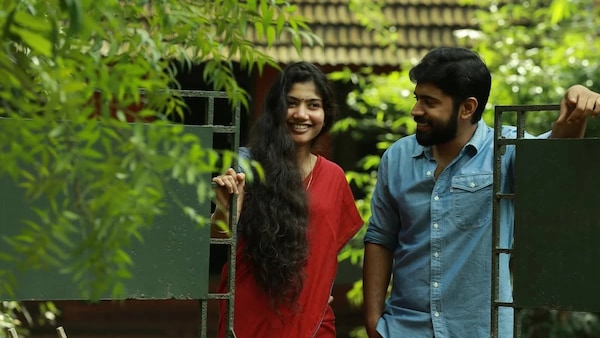Premam: A Labour Of Love About Love's Labour Lost
Exquisitely naïve and spontaneous, the Nivin Pauly-starrer remains mint-fresh on every re-watch.

Last Updated: 02.51 AM, Oct 06, 2022
This column was originally published on 26 September 2022, as part of our newsletter The Daily Show. Subscribe here . (We're awesome about not spamming your inbox!)
***
Premam's defining moment occurs around halfway point in its runtime. George (Nivin Pauly) and his friends are back in college after a deferral, taking their juniors to task when She walks in. It takes a whole minute to fully register Malar Miss (Sai Pallavi) — her starched cotton sari; long, flowing hair clipped back from a freckled face devoid of make-up. Her not-conventionally-saccharine voice and her smile turn your heart over.
Sai Pallavi was Premam’s biggest revelation. It takes more than courage to break the glass ceiling for heroines in Malayalam cinema. But here was a heroine who looked so real and endearing, that in a split second, the unrealistic standards of beauty glorified for decades in mainstream cinema, came (happily) crashing down. Malar defined Premam.
On paper, Premam is an ordinary coming-of-age story, chronicling George’s life from his school days to adulthood. But director Alphonse Puthren builds George’s world with a crazy irreverence, familiarity and wit, persuading us to join in, reflect, appreciate, and laugh along with the characters.
Puthren masterfully stages nostalgia in the film. So the image of Mary (Anupama Parameswaran) in her pigtails and tailored uniform, strolling into a tea-shop and gazing longingly at the thick glass jars filled with peanut bars, lemon candies and dal vadas would have instant recall value for any late ‘90s kid. Similarly, a smitten George discussing the merits of various wooing methods with his friends, over Nannari soda, and getting distracted over khus khus, blends the throwback mood and his character traits seamlessly. Another smart choice is George’s whimsical intro fight in college, against the backdrop of a popular movie soundtrack. This was an era when boys would cycle around the homes of girls, hoping to catch a glimpse of their crush if she stepped out onto the terrace. Or when dads would quiz male friends about their family names before handing the phone over to daughters.
Love clearly makes George’s world go around. And he persistently chases it in every phase of his life. It starts in school with Mary; doesn’t work. Shifts to Malar in college; results in heartbreak. Later, it reaches fruition with Celine (Madonna Sebastian). George is a typical man-child, still smarting from Mary’s rejection when he meets Malar. Though there are dramatic changes in his appearance, in reality George never grows up: he just channelises his immaturity in a different ways. He sulks every time he suffers a broken heart.
Nivin Pauly fully inhabits George, bringing out the transition from puberty, teenage years to adulthood with complete authenticity.
There is a lingering wistfulness in the frames, especially when they enter the classrooms, casually zooming on the disorderliness, flirtatious exchanges, cheeky teacher-student dynamics, and that intangible sense of freedom. For the most part, the viewer is like a fly on the wall — chuckling at the conversations, blushing when George stares at Malar, stifling a grin at Vimal Sir’s desperate attempts to win over Malar, enjoying PT Sir’s cool dance moves.
Actors still speak about the luxury of improvisation they enjoyed on the sets of Premam. Sharafudheen’s Girirajan Kozhi, for instance, is one such bit of improv that later became an iconic meme. He makes a hysterical entry just when George is mustering the courage to propose to Mary. His proposal to a stunned Mary is so outrageously muddled that you can’t help but laugh at his impudence.
There aren’t complex characters with dark and turbulent backstories; instead, they’re people you’re quite likely to have met (or will meet) at some point in your life.
Premam’s frames are woven with an intense pining for a bygone generation, each dialogue a nod to the mischief and innocence of that age, that the film almost unfolds like a dusty photo album. There are overlapping dialogues, shaky camera shots and unnecessary song placements — yet it all strangely falls into place. Premam is exquisitely naïve and spontaneous, and remains mint-fresh with every revisit.
